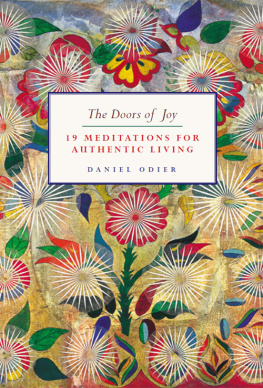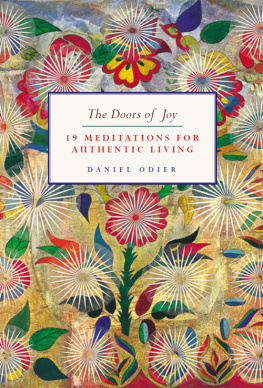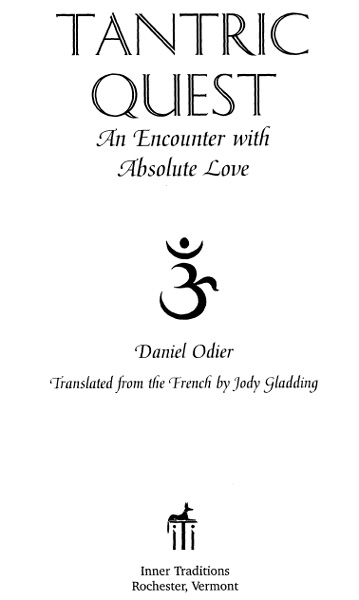For Kalou Rinpoche and Devi, my masters
In truth, every body is the universe.
Mahanirvana tantra
INTRODUCTION
Shivaic Tantrism of Kashmir occupies an extraordinary place in the history of thought. Originating seven thousand years ago in the Indus valley; this mystical, scientific, and artistic movement of the Dravidian culture encompasses all human potential and assigns a special place to the adept who is totally engaged in the way of knowledge. Tantrism is probably the only ancient philosophy that has survived all historical upheavals, invasions, and influences to reach us intact by uninterrupted transmission from master to disciple, and the only one, as well, to retain the image of the Great Goddess without inverting the power between woman and man to favor the latter. Entire lineages have followed great women masters, and still today; numerous yoginis transmit this age-old wisdom. Great male masters have often retained the custom of initiating a female disciple as a way to draw from the very source of power.
The Dravidians, seafaring people, built the great cities of Mohenjo Daro and Harappa. Their civilization extended from the Indus valley, in what is now Pakistan, to the Red Sea and the Mediterranean. The invasion of Aryan tribes from the Ukraine, three thousand years ago, put an end to the Dravidian civilization, but the formidable mystical movement underlying it survived. The masters fled the occupied citadels and took up residence in the countryside and in inaccessible places throughout the Himalayan mountain chain.
Shivaic Tantrism reemerged openly at the beginning of the fourth century A.D. in Kashmir, located, naturally, at the crossroads of the great cultural and commercial routes. Kashmir was part of the mysterious country of Oddiyana, situated between Afghanistan, India, and Pakistan. It included the valley of Swat, birthplace of numerous Mahasiddhas and dakinis, great Tantric initiators who spread the doctrine throughout the rest of India, Nepal, China, and Tibet.
Shiva and Shakti, the inseparable divine couple, are the gods of the ecstatic dance and the creators of the yoga that allows adepts to rediscover the divine at the root of their own minds by opening the heart. In the West, we usually move about in a universe based on duality: In the beginning, "God separated the light from the darkness" (Genesis 1:3). It is essential to understand that Tantrism stands apart from all separation between light and darkness, humans and gods. It is non-dualistic. It considers the mind to be fundamentally illuminated. Thus, the mind harbors all divinity. It is the source from which all is born and to which all returns: all phenomena, all differentiations, all mythical and divine creations, all sacred texts, all teachings, all illusory dualities.
The work of tantrikas, Tantric adepts, is thus to dispense with the illusory obscurities from which the ego, which originated these distinctions in the first place, arises. They then realize the nature of their own intrinsically pure minds. In dualistic thought, we imagine God outside of ourselves and direct our desire for union toward the exterior. In non-duality, the quest is reversed. Mystic energy is directed toward the interior, toward the mind. To realize the nature of the mind is thus the highest accomplishment. From this perspective, the passions are no longer considered antagonistic to mystical life. Their energy is used directly by the tantrika, and it is in this great conflagration that ardor dissolves the ego.
Needless to say, the widespread image that reduces Tantrism to vague sexual techniques meant to miraculously liberate their practitioners, under the guise of spirituality, has nothing to do with Shivaism. Such practicesineffectual, since they are not based on true yoga asceticism, which depends upon the triple mastery of the breath, mental emptiness, and bodily processesare, at best, only harmless deviances, not so harmless if manipulation is involved.
Tantrism is a way of total love, which leads to the freedom to be. It is through this story of my encounter with a great yogini and her teachings that I invite you to share this marvelous experience.
Her dark skin perfumed and oiled, the yogini seemed to float in space, her legs pulled up into Vs on either side of her body, her expression illuminated. Her open sex, where all originates and returns, radiated golden light, which met the blue of the sky. I remained fascinated, seated silently next to the Chinese yogi who had welcomed me into his hermitage. The yogini, his companion, at the same time close and distant, body and spirit, power and gift, steady in her yoga posture, was the incarnation of the extraordinary potential of realization.
The yogi practiced both Tantrism and Ch'an, or Zen, of Chinese origin, following the example of the sixth-century Indian master, Bodhidharma, heir to the two lineages. The twenty-eighth patriarch after the historical Buddha, and the first Patriarch of Zen, Bodhidharma arrived in China by sea and established himself in the famous monastery at Shao-lin, where he spent nine years meditating in front of a rock wall before transmitting the dharma (the doctrine) to Hui-k'o, the Second Chinese Patriarch. The dialogue between Bodhidharma and the Chinese emperor Wu of the Liang dynasty, a defender of Buddhism who was left puzzled by the laconic responses of the First Patriarch, is still well known:
"What merit have I gained by supporting Buddhism and building so many temples?"
"None."
"What is the highest meaning of the Sacred Truth?"
"Nothing is sacred. All is void."
"Who is this who is facing me?"
"I don't know."
The doctrine of Bodhidharma has four tenets:
direct transmission, over and above the Buddhist scriptures,
a foundation not in the texts but in the experience of Awakening,
revelation to each individual disciple of the nature of his or her mind,
contemplation of one's true nature, which is the Buddha nature.
We can see that these four main points correspond to the teachings of Tantric Shivaism, which are their source.
At the time of my departure, my host gave me a copy of his commentary and translation of the Vijnanabhairava Tantra, one of the most ancient and profound of the Tantric texts, held in high esteem by the Shivaites. This Tantra gave me my first glimpse of the goddess and the way that led me to meet my master, the Shivaic yogini Devi, seven years later, on the other side of India.
My interest in Buddhism, Hinduism, and Tantrism had declared itself very early. As a Protestant student in an austere abbey at the foot of a high rock wall, I had discovered and become fascinated with the splendors of religious services, where I sometimes served in a crimson vestment trimmed with lace. A resident bishop, a fabulous treasure given to the abbey by Charlemagne, a fantastically talented organist, and an excellent choir of which I was part captivated me from the start. Very strict studies and 6:30 mass every morning, followed by half an hour of work before breakfast did what was necessary to build character. Corporal punishment was still practicedan assortment of various tortures like kneeling for an hour, arms crossed, a dictionary on each hand. Sometimes the periods of free time were replaced with interminable hours of copying out the texts of Latin authors or pages from the Petit Larousse. At night, the huge dormitories were crossed in silence; strange meetings took place on the roofs, where we went to smoke and talk about love. In such places there was terrible loneliness, a sometimes unbearable lack of affection, suicide attempts, forced vocations, bloody fights from which I still have scars, and sordid stories of love. Nevertheless, the excellence of the teachers; their devotion; the personality of the director, who charged around on his motorbike, cassock billowing in the wind; and the general atmosphere of the place had me seduced.





